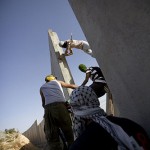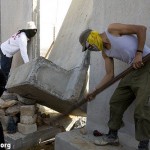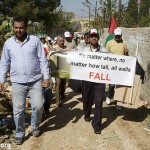6 November 2009
20 years to the fall of the Berlin wall: Demonstrators toppled 8 meters tall concrete wall in Ni’ilin
Three protest marches were held today in the West Bank to mark the 20th anniversary to the fall of the Berlin wall, which has been declared an international day of action against Israel’s barrier. In Ni’lin, the 300 demonstrators managed to topple a part of the eight meters tall concrete wall that cuts through the village’s land. Following the direct action, the army fired scores of live rounds at the demonstrators.
The concrete wall in Ni’lin – five to eight meters (15 to 25 feet) in height – has only recently been laid on the path of the wall cutting through Ni’lin’s lands, in addition to the already existing electronic barrier and razor-wire.
Since the Wall was built to allow more land to annexed to the nearby settlements rather than in a militarily strategic manner, demonstrators have been able to repeatedly dismantle parts of the electronic fence and razor-wire surrounding it. The section of the Wall in Ni’lin is the only place along the route of the barrier where a concrete wall has been erected in an attempt to deal with the civic, unarmed campaign waged by the village in protest of the massive land theft that will enable the expansion of the illegal settlements of Modi’in Il’it and Hashmonaim.
Since Israel began its construction in the year 2002, This is the first time demonstrators succeed in toppling a part of Israel’s barrier which is a concrete wall. One of the demonstrators, Moheeb Khawaja, said during the protest: “Twenty years ago no one had thought the monster that divided Berlin into two could be brought down, but in only two days in November, it did. Today we have proven that this can also be done here and now. It is our land beyond this wall, and we will not give up on it. We will win for a simple reason – justice is on our side.”
Background
Israel began construction of the Wall on Ni’lin’s land in 2004, but stopped after an injunction order issued by the Israeli Supreme Court (ISC). Despite the previous order and a 2004 ruling from the International Court of Justice declaring the Wall illegal, construction of the Wall began again in May 2008. Following the return of Israeli bulldozers to their lands, residents of Ni’lin have launched a grassroots campaign to protest the massive land theft, including demonstrations and direct actions.
The original route of the Wall, which Israel began constructing in 2004, was ruled illegal by the ISC, as was a second, marginally less obtrusive proposed route. The most recent path, now completed, still cuts deep into Ni’lin’s land. The Wall has been built to include plans, not yet approved by the Army’s planning authority, for a cemetery and an industrial zone for the illegal settlement Modi’in Ilit.
Since the Wall was built to annex more land to the nearby settlements rather than in a militarily strategic manner, demonstrators have been able to repeatedly dismantle parts of the electronic fence and razor-wire surrounding it. Consequently, the army has erected a 15-25 feet tall concrete wall, in addition to the electronic fence. The section of the Wall in Ni’lin is the only part of the route where a concrete wall has been erected in response to civilian, unarmed protest.
As a result of the Wall construction, Ni’lin has lost 3,920 dunams, roughly 30% of its remaining lands. Originally, Ni’lin consisted of 15,898 dunams (3928 acres). Post 1948, Ni’lin was left with 14,794 dunams (3656 acres). After the occupation of the West Bank in 1967, the illegal settlements and infrastructure of Modi’in Ilit, Mattityahu and Hashmonaim were built on village lands, and Ni’lin lost another 1,973 dunams. With the completion of the Wall, Ni’lin has a remaining 8911 dunams (2201 acres), 56% of it’s original size.
Ni’lin is effectively split into 2 parts (upper and lower) by Road 446, which was built directly through the village. According to the publicized plan of the Israeli government, a tunnel will be built under road 446 to connect the upper and lower parts of Ni’lin, allowing Israel to turn Road 446 into a segregated-setter only road. Subsequently, access for Palestinian vehicles to this road and to the main entrances of upper and lower Ni’lin will be closed. Additionally, since the tunnel will be the only entryway to Ni’lin, Israel will have control over the movement of Palestinian residents.
Israel commonly uses tear-gas projectiles, rubber coated steel bullets and live ammunition against demonstrators.
Since May, 2008, five of Ni’lin’s residents were killed and one American solidarity activist was critically injured from Israeli fire during grassroots demonstrations in Ni’lin.
- 5 June 2009: Yousef Akil Srour (36) was shot in the chest with 0.22 caliber live ammunition and pronounced dead upon arrival at a Ramallah hospital.
- 13 March 2009: Tristan Anderson (37), an American citizen, was shot in the head with a high velocity tear gas projectile. He is currently at Tel Hashomer hospital near Tel Aviv with uncertain prospects for his recovery.
- 28 December 2008: Mohammed Khawaje (20) was shot in the head with 5.56mm caliber live ammunition. He died in a Ramallah hospital 3 days later on 31 December 2008.
- 28 December 2008: Arafat Rateb Khawaje (22) was shot in the back with 5.56mm caliber live ammunition and pronounced dead upon arrival at a Ramallah hospital.
- 30 July 2008: Yousef Amira (17) was shot in the head with two rubber coated steel bullets. He died in a Ramallah hospital 5 days later on 4 August 2008.
- 29 July 2008: Ahmed Mousa (10) was shot in the forehead with 5.56mm caliber live ammunition and pronounced dead upon arrival at a Ramallah hospital.
In total, 19 people have been killed during demonstrations against the Wall.
Israeli armed forces have shot 40 demonstrators with live ammunition in Ni’lin. Of them, 11 were shot with 5.56mm caliber live ammunition and 24 were shot with 0.22 caliber live ammunition.
Since May 2008, 87 arrests of Ni’lin residents have been made in relation to anti-Wall demonstrations in the village. The protesters seized by the army constitute around 7% of the village’s males aged between 12 and 55. The arrests are part of a broad Israeli intimidation campaign to suppress all demonstrations against the apartheid infrastructure in the West Bank.



